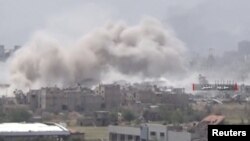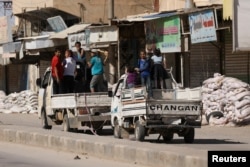A Syrian war monitor says airstrikes early Monday killed 23 people near the country's border with Iraq.
The Britain-based Syrian Observatory for Human Rights said the strikes in Al-Bukamal were likely carried out by the U.S.-led coalition that has been targeting Islamic State with bombs since late 2014.
There was no immediate comment on the airstrikes from the coalition, which has said its actions were likely responsible for killing more than 350 civilians since the air campaign began. Rights groups say the figure is much higher.
The strikes came a day before U.N. envoy Staffan de Mistura was set to convene the next round of peace talks aimed at bringing an end to the conflict. The envoy said Monday he expects the negotiations to go until Friday or Saturday, and that efforts led by Russia and Turkey to achieve smaller cease-fires cannot be sustained unless there is progress toward a political resolution.
More evacuations
On Sunday, at least 1,500 Syrian rebels and their families abandoned another long-held district just outside Damascus, as the army of President Bashar al-Assad and its allies push to seize full control of the capital and surrounding areas for the first time in nearly five years.
State media and witnesses said the evacuation began at dawn, less than a day after government forces captured the Qaboun district, and just days after hundreds of other beleaguered rebel fighters and their families departed two other nearby districts.
A government deal facilitating the Qaboun evacuation was announced late Saturday. It replicates earlier agreements under which rebels were granted safe passage to rebel-held territory near the Turkish border in exchange for an end to weeks of shelling and airstrikes by Syrian and allied Russian warplanes.
Government forces have pressed for several months to recapture rebel districts north and east of Damascus, and analysts say they succeeded only after discovering and destroying underground tunnels that connected the three neighborhoods.
As civil war raged near the capital, Kurdish-led Syrian forces far to the north pressed a separate offensive against Islamic State extremists just outside the de facto IS capital, Raqqa.
Syrian Kurds battle IS in north
Monitors from the Syrian Observatory for Human Rights reported a third straight day of fighting between the U.S.-backed Syrian Democratic Forces (SDF) and IS fighters seeking to defend their stronghold city.
There were no reports of casualties, but witnesses reported hundreds of civilians fleeing toward SDF battle lines on Sunday as the anti-jihadist force took aim at extremist fighters.
Monitors on Saturday reported that SDF forces had advanced within four kilometers of Raqqa, and an SDF spokesman predicted an all out offensive on the city within the next several months.
Forces pushing to liberate Raqqa include SDF forces attacking from the north and rival Syrian ground forces backed by Shi'ite allies and Russia pressing toward the city from the south.
Sunni Arab and Turkmen militias also are involved, along with a separate contingent of Turkish-backed forces opposed to a faction of Kurdish fighters in the U.S.-backed SDF alliance.
U.S. advisers have so far maintained peace within the factions by creating buffer zones separating Kurdish fighters from Turkish-backed forces.
Anti-jihadist push gains steam
It remains unclear what, if any, role Syrian government forces and their Russian allies will play in the planning or execution of the complex Raqqa offensive.
The push to retake Raqqa appears to have gathered strength, after U.S. President Donald Trump announced a decision last week to arm Kurdish-led forces with heavy weapons.
That decision has been roundly criticized by Turkey, which sees a key Syrian Kurdish unit in the U.S.-backed SDF alliance, the so-called YPG, as an extension of the outlawed Kurdistan Workers' Party, the PKK.
Turkish leaders have voiced fears that any heavy weaponry used by the SDF against extremists at Raqqa will eventually fall into the hands of PKK fighters, who have battled the Turkish government for an autonomous homeland in Turkey's southeast for more than three decades.
Turkish President Recep Tayyip Erdogan, who opens an official visit to Washington Tuesday, told reporters last week that he hoped "this [U.S. decision] will be reversed immediately."



